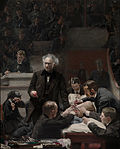The Agnew Clinic
The Agnew Clinic is a painting by American artist Thomas Eakins, completed in 1889. It is one of Eakins' most renowned works and is considered a significant contribution to the field of medical art. The painting depicts Dr. David Hayes Agnew, a prominent surgeon of the time, performing a mastectomy in a medical amphitheater.
Background[edit]
Thomas Eakins was a realist painter, photographer, sculptor, and fine arts educator. He is widely acknowledged as one of the most important artists in American art history. Eakins' works focused on the human figure and were marked by a desire for realism, the use of scientific perspective, and the depiction of the human body with frankness.
David Hayes Agnew was a renowned surgeon and professor at the University of Pennsylvania. He was known for his expertise in the field of surgery and his ability to teach complex medical procedures to his students. The Agnew Clinic was commissioned by Agnew's students as a retirement gift.
Description[edit]
The Agnew Clinic depicts a mastectomy operation being performed by Dr. Agnew in a medical amphitheater. The painting is notable for its realistic depiction of the surgical procedure and the environment in which it takes place. Eakins' attention to detail is evident in the accurate representation of the surgical instruments, the positioning of the medical staff, and the patient herself.
Reception and Legacy[edit]
The Agnew Clinic was initially met with mixed reviews due to its graphic nature and the unconventional portrayal of the female body. However, it has since been recognized as a masterpiece of medical art and a testament to Eakins' skill and dedication to realism.
The painting is currently housed in the University of Pennsylvania's art collection and continues to be a subject of study for both art and medical students. It serves as a historical record of medical practices in the late 19th century and a symbol of the intersection between art and science.
See Also[edit]
|
<img src="//upload.wikimedia.org/wikipedia/commons/thumb/a/ac/VisualEditor_-_Icon_-_Brush.svg/40px-VisualEditor_-_Icon_-_Brush.svg.png" alt="Stub icon" width="40" height="40" /> |
-
Portrait of Dr. Samuel D. Gross (The Gross Clinic)
-
David Hayes Agnew
-
The Agnew Clinic
-
Sketch for The Agnew Clinic
-
Thomas Eakins, painted plaster with lead palette by Samuel Murray, 1907
Ad. Transform your life with W8MD's Budget GLP-1 injections from $75


W8MD offers a medical weight loss program to lose weight in Philadelphia. Our physician-supervised medical weight loss provides:
- Weight loss injections in NYC (generic and brand names):
- Zepbound / Mounjaro, Wegovy / Ozempic, Saxenda
- Most insurances accepted or discounted self-pay rates. We will obtain insurance prior authorizations if needed.
- Generic GLP1 weight loss injections from $75 for the starting dose.
- Also offer prescription weight loss medications including Phentermine, Qsymia, Diethylpropion, Contrave etc.
NYC weight loss doctor appointmentsNYC weight loss doctor appointments
Start your NYC weight loss journey today at our NYC medical weight loss and Philadelphia medical weight loss clinics.
- Call 718-946-5500 to lose weight in NYC or for medical weight loss in Philadelphia 215-676-2334.
- Tags:NYC medical weight loss, Philadelphia lose weight Zepbound NYC, Budget GLP1 weight loss injections, Wegovy Philadelphia, Wegovy NYC, Philadelphia medical weight loss, Brookly weight loss and Wegovy NYC
|
WikiMD's Wellness Encyclopedia |
| Let Food Be Thy Medicine Medicine Thy Food - Hippocrates |
Medical Disclaimer: WikiMD is not a substitute for professional medical advice. The information on WikiMD is provided as an information resource only, may be incorrect, outdated or misleading, and is not to be used or relied on for any diagnostic or treatment purposes. Please consult your health care provider before making any healthcare decisions or for guidance about a specific medical condition. WikiMD expressly disclaims responsibility, and shall have no liability, for any damages, loss, injury, or liability whatsoever suffered as a result of your reliance on the information contained in this site. By visiting this site you agree to the foregoing terms and conditions, which may from time to time be changed or supplemented by WikiMD. If you do not agree to the foregoing terms and conditions, you should not enter or use this site. See full disclaimer.
Credits:Most images are courtesy of Wikimedia commons, and templates, categories Wikipedia, licensed under CC BY SA or similar.
Translate this page: - East Asian
中文,
日本,
한국어,
South Asian
हिन्दी,
தமிழ்,
తెలుగు,
Urdu,
ಕನ್ನಡ,
Southeast Asian
Indonesian,
Vietnamese,
Thai,
မြန်မာဘာသာ,
বাংলা
European
español,
Deutsch,
français,
Greek,
português do Brasil,
polski,
română,
русский,
Nederlands,
norsk,
svenska,
suomi,
Italian
Middle Eastern & African
عربى,
Turkish,
Persian,
Hebrew,
Afrikaans,
isiZulu,
Kiswahili,
Other
Bulgarian,
Hungarian,
Czech,
Swedish,
മലയാളം,
मराठी,
ਪੰਜਾਬੀ,
ગુજરાતી,
Portuguese,
Ukrainian





